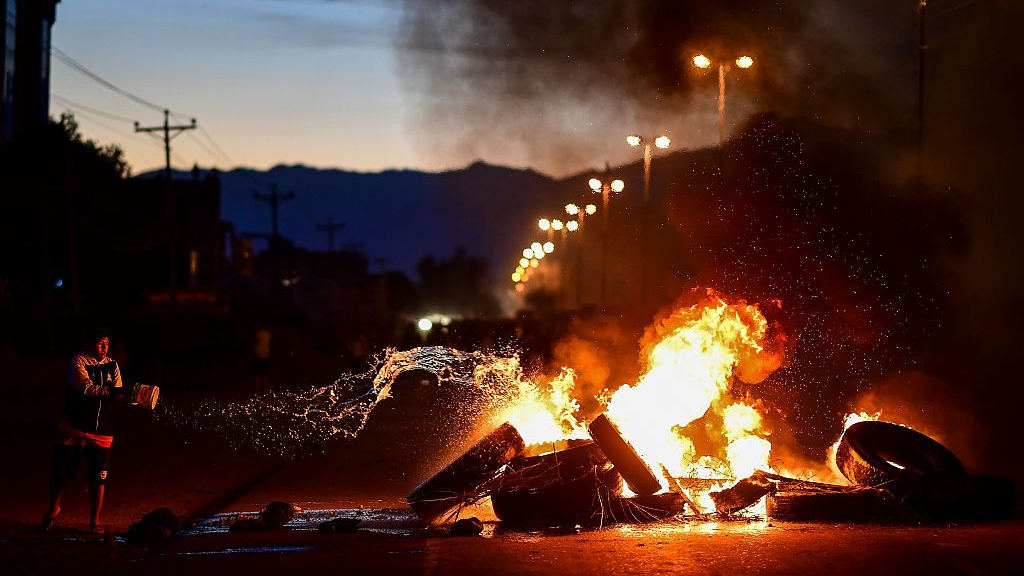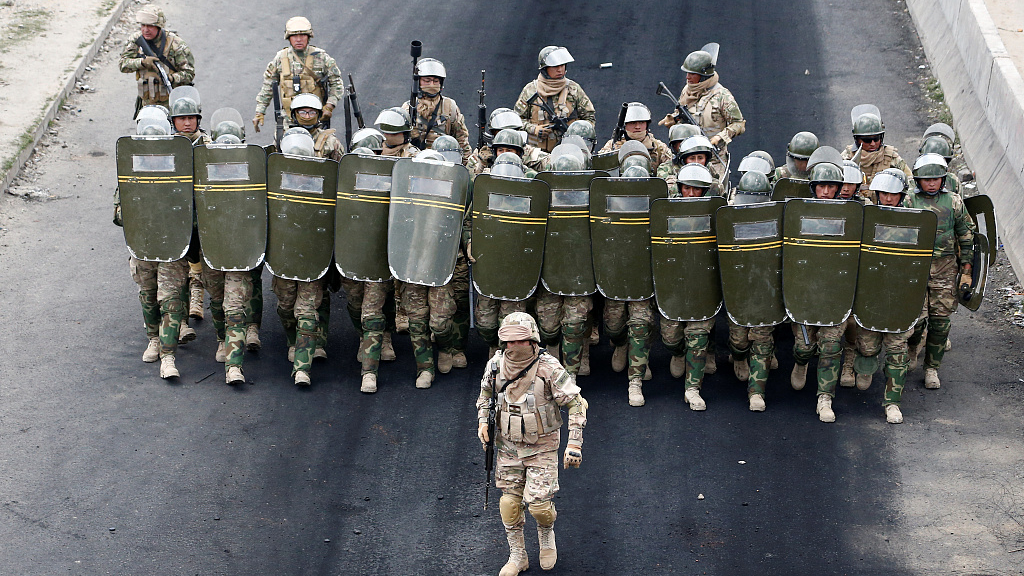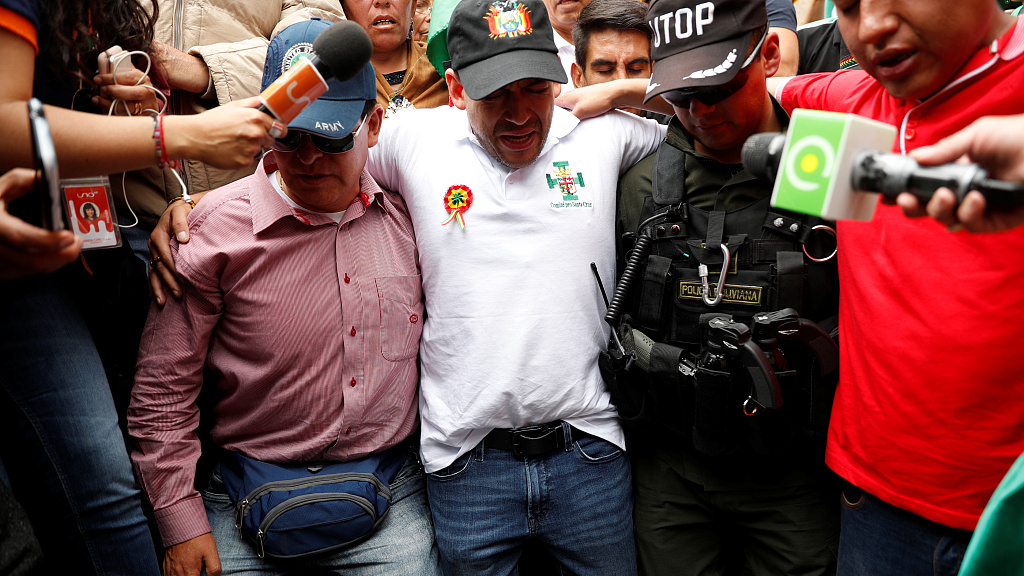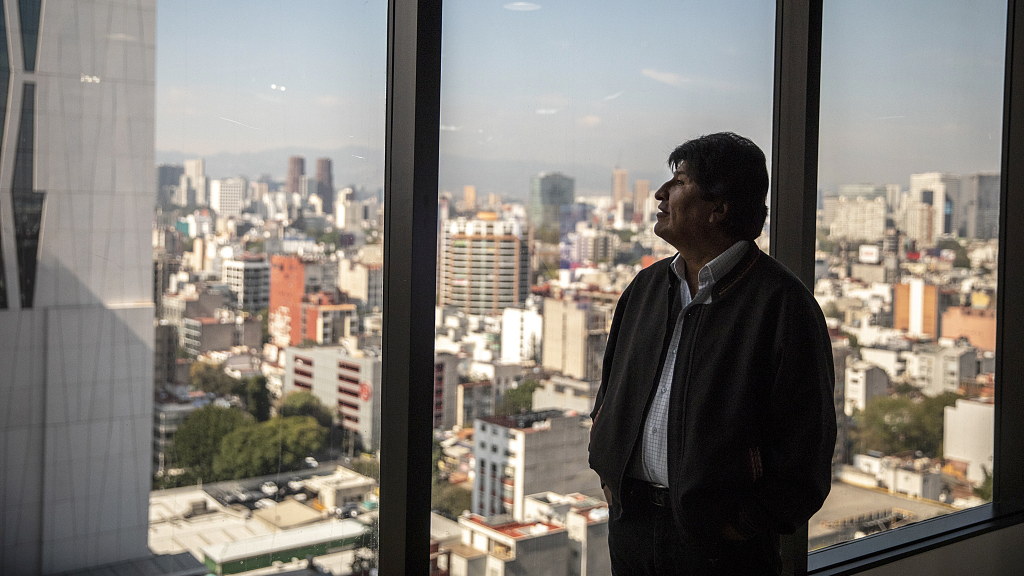
A man extinguishes the fire of a blockade set by supporters of Bolivian ex-president Evo Morales in the outskirts of Sacaba, Chapare province, Cochabamba, November 18, 2019. /VCG photo
A man extinguishes the fire of a blockade set by supporters of Bolivian ex-president Evo Morales in the outskirts of Sacaba, Chapare province, Cochabamba, November 18, 2019. /VCG photo
Editor's Note: Ceng Jing is an editor with CGTN Digital. The article reflects his views and not necessarily those of CGTN.
Bolivia has fallen into the grips of political upheaval within a surprisingly short span of time. In a latest move, its interim government accused the exiled former president Evo Morales of committing acts of terrorism and sedition. Earlier this month, at least five activists supporting the return of Evo Morales died in a fierce clash with the country's security forces, marking a new wave of unrest.
A week ago, after alomost 14 years of rule in the Andean nation, Morales abruptly submitted his resignation and flew to Mexico for political asylum.
"My sin was being indigenous, leftist and anti-imperialist," Morales said.
As Bolivia's first indigenous president, Morales was seen as a leftist icon and widely popular among the country's indigenous population which had in the past been marginalized under the colonial rule of the Spanish Empire. Before leaving, Morales emphasized that it was his responsibility to "prevent coup-mongers from persecuting my trade unionist brothers and sisters, abusing and kidnapping their families, burning the homes of governors and legislators."

Members of the security forces stand guard during a protest in Senkata, El Alto, Bolivia, November 19, 2019. /VCG photo
Members of the security forces stand guard during a protest in Senkata, El Alto, Bolivia, November 19, 2019. /VCG photo
Demonstrations turned violent in the streets of Sucre, the country's capital after the Washington-headquartered Organization of American States (OAS) questioned the legitimacy of Morales win in the latest election, while offering no concrete evidence.
On October 22, the outraged "pro-democracy" protesters set fire to ballot boxes, rendering a democratic process impossible, despite Morales' offer of a reelection. Several lawmakers were also attacked, including a small town mayor who was dragged through the streets barefoot and covered in red paint.
Morales' departure now leaves a power vacuum in Bolivia as his supporters took to the streets to protest the unelected Jeanine Anez – former president of the Senate. Since declaring herself president, many have casted doubt about the forces that propelled her to the nation's highest office.
A right-wing conspiracy?
Shortly after Morales boarded the flight to Mexico, Luis Fernando Camacho and his loyal followers ransacked his residence and broke into the Presidential Palace.
A 40-year-old wealthy lawyer from the country's affluent Santa Cruz region, Camacho was the leader of the Santa Cruz Youth Union, a group espousing a far-right ideology.

Luis Fernando Camacho (Center), a Santa Cruz civic leader and major opposition figure, prays during a protest against Bolivia's ex-president Evo Morales in La Paz, Bolivia, November 10, 2019. /VCG photo
Luis Fernando Camacho (Center), a Santa Cruz civic leader and major opposition figure, prays during a protest against Bolivia's ex-president Evo Morales in La Paz, Bolivia, November 10, 2019. /VCG photo
For long, Camacho as a member of Bolivia's conservative elite has resented many policies and social programs enacted under the leftist Morales administration, including nationalization of the country's oil and gas. The newly acquired government revenue was then largely redistributed to the underprivileged and lifted at least half a million Bolivians out of poverty. In a country that has long been ruled by light-skinned descendants of the Spanish conquistadors, racism against the native population is deeply ingrained in the political and social structure.
Carlos Mesa was the frontman behind the opposition movement. As president from 2003 to 2005, Mesa continued the legacy of his ousted predecessor and represented the interest of big businesses and multinational corporations. In 2005, he was forced to resign as angry Bolivians took to the streets to protest the exploitation of the country's rich natural gas reserves by foreign firms. In the latest elections, he came in second but still 10 percent behind Morales.
According to leaked U.S. government cables released by Wikileaks, Mesa had at least one meeting with the charge d'affaires of U.S. embassy in Bolivia where he discussed how to one-up Morales. Yet, he is only part of a network of U.S. affiliates inside Bolivia who helped carry out the will of Uncle Sam.
The School of the Americas
"The history of Bolivia and Latin America is a tale of foreign intervention," said Guo Cunhai, director of the Department of Social and Cultural Studies of the Institute of Latin American Studies at the Chinese Academy of Social Sciences. "Just by looking at the Latin American experience, the U.S. definitely played a hidden hand in the recent events in Bolivia."
The U.S. has an extensive history of meddling in Latin American affairs and has been looking to overthrow the Morales administration for decades. In 2008, the U.S. Embassy coordinated the "media luna" coup that saw horrific racial violence as far-right groups in Santa Cruz attempted to gain autonomy with the help of foreign terrorist cells, according to cables released by Wikileaks.

Bolivian police officers with their faces covered stand at the balcony of a police station in Santa Cruz, Bolivia, November 8, 2019. /VCG photo
Bolivian police officers with their faces covered stand at the balcony of a police station in Santa Cruz, Bolivia, November 8, 2019. /VCG photo
On November 10, Morales encountered the biggest betrayal of his presidency when the commander of Bolivia's armed forces asked him to step down. Shortly after, police forces joined the protesters in an apparent mutiny. As a recent investigation by The Grayzone, an independent political news website, showed, the man sitting at the top of Bolivia's police and military structure received his training at the infamous School of the Americas based in Fort Benning, Georgia. The school has been a training camp for coup plotters dating back to the height of the Cold War.
On the social front, the U.S. relied on young and digital-fluent information warriors like Jhanisse V. Daza to gain the hearts and minds of her peers. On popular digital platforms such as Instagram and Twitter, she frequently posts pictures and memes denouncing Morales' administration as an authoritarian regime. Looking to capitalize on the world's attention to the Amazon rainforest wildfires, she started the #SOSBolivia social media campaign aimed at pinning the blame on Morales, despite little correlation. As a NASA report showed, Bolivia's most affected areas were not even in the Amzon.
After getting her college degree from Kent State University in Ohio, Daza enrolled in "Leading Non-Violent Movements for Social Progress" program at the elite Harvard Kennedy School. She also consistently attended Oslo Freedom Forum known for brainwashing young people to become revolutionaries that ultimately achieve foreign policy objectives of the U.S.
In a BBC report, reporter Laura Kuenssberg described how participants of the forum, including leaders of the U.S.-funded Uygur World Congress and frontline protesters in the Hong Kong Occupy Central protests, learned to use "non-violent action" as "weapons of mass destruction."

Evo Morales, Bolivia's former president, stands for a photograph following an interview in Mexico City, Mexico, November 18, 2019. /VCG photo
Evo Morales, Bolivia's former president, stands for a photograph following an interview in Mexico City, Mexico, November 18, 2019. /VCG photo
"The North American empire doesn't forgive that a left-wing country, a socialist community shows the world that there is a non-capitalist way of doing things with equality, dignity and identity," Morales said in a recent interview with Al Jazeera. "But we will be back to Bolivia and join the fight to strengthen our social forces."